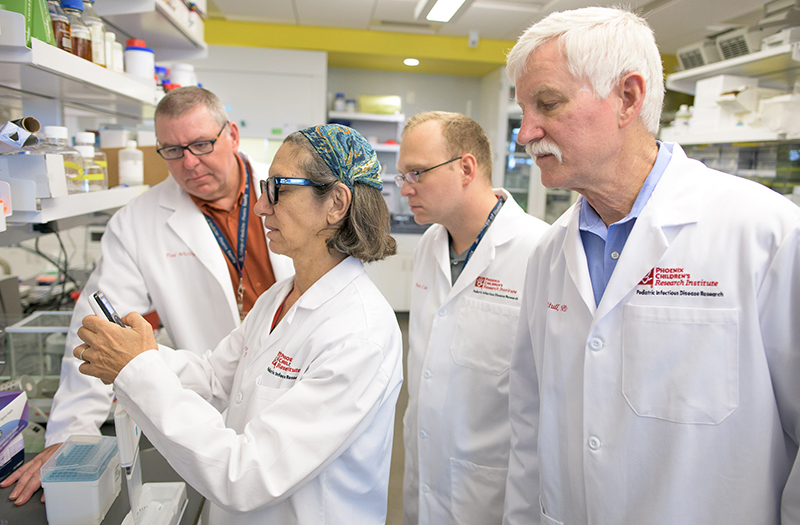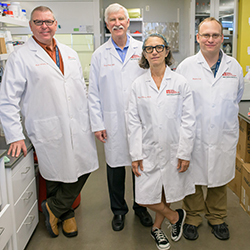
Researcher Hopes to Find Cure for the Common Ear Infection

Dr. Stull arrived at the University of Arizona College of Medicine – Phoenix in October 2016 after serving as chairman of the Department of Pediatrics at the University of Oklahoma Health Sciences Center for 22 years. He is a professor in the Department of Child Health and senior vice president of research at Phoenix Children’s Hospital.
Explain Your Research
Our laboratory is a molecular genetics laboratory. My research has focused on H. influenzae since my Infectious Diseases fellowship training in Seattle after training to become a pediatrician. For many years, we investigated the molecular events that allowed H. influenzae to cause infection, specifically the molecular mechanisms of iron and heme acquisition. We decided that we spent so many years studying the H. influenzae that we would try to get rid of it. The way to get rid of it would be a vaccine. So, we took our molecular genetics skill set and applied it to the world of vaccinology.
What is Your Approach?
We are interested in using reverse vaccinology to identify protein vaccine targets for H. influenzae. In reverse vaccinology, we use bioinformatics and analyze genome sequences rather than starting by growing the bacteria. We start backward.
During the past five years, we have identified the most likely H. influenzae vaccine targets that the immune system could attack to prevent infections. Now, these proteins can be tested to see if they protect against ear infections and infections in people with COPD.
Why is this Research Important?

Are You Involved in Additional Research?
In addition to H. influenzae research, we developed the method of ribotyping that first demonstrated the person-to-person transmission of the antibiotic-resistant bacteria B. cepacia in people with cystic fibrosis. This impacted how cystic fibrosis patients are cared for. This was the first time it was demonstrated that a bacteria moves from one person with cystic fibrosis to another, meaning it’s contagious. Because of this, the Cystic Fibrosis Foundation has progressively developed clinical protocols for reducing infections in people with cystic fibrosis
Topics
About the College
Founded in 2007, the University of Arizona College of Medicine – Phoenix inspires and trains exemplary physicians, scientists and leaders to advance its core missions in education, research, clinical care and service to communities across Arizona. The college’s strength lies in our collaborations and partnerships with clinical affiliates, community organizations and industry sponsors. With our primary affiliate, Banner Health, we are recognized as the premier academic medical center in Phoenix. As an anchor institution of the Phoenix Bioscience Core, the college is home to signature research programs in neurosciences, cardiopulmonary diseases, immunology, informatics and metabolism. These focus areas uniquely position us to drive biomedical research and bolster economic development in the region.
As an urban institution with strong roots in rural and tribal health, the college has graduated more than 1,000 physicians and matriculates 130 students each year. Greater than 60% of matriculating students are from Arizona and many continue training at our GME sponsored residency programs, ultimately pursuing local academic and community-based opportunities. While our traditional four-year program continues to thrive, we will launch our recently approved accelerated three-year medical student curriculum with exclusive focus on primary care. This program is designed to further enhance workforce retention needs across Arizona.
The college has embarked on our strategic plan for 2025 to 2030. Learn more.